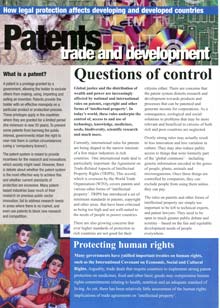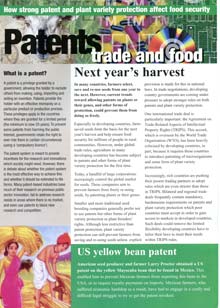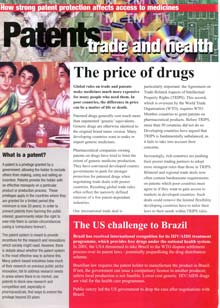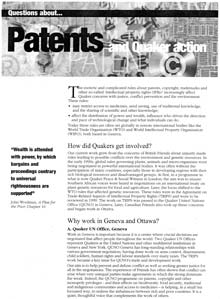
Work with the Quakers on Intellectual Property
 Until 2007, I advised the Quaker International Affairs Programme (QIAP) in Ottawa and the Quaker United Nations Office (QUNO) in Geneva, on their work on intellectual property and development
Until 2007, I advised the Quaker International Affairs Programme (QIAP) in Ottawa and the Quaker United Nations Office (QUNO) in Geneva, on their work on intellectual property and development
As part of this work, I managed a publishing programme producing a range of publications. These included background, discussion, issues and occasional papers listed here. Apart from the background papers, all were aimed specifically at those who negotiate on these issues. Please go to the QUNO website for more recent publications
DISCUSSION PAPERS - there were written for trade negotiators and policy makers responsible for analysing and assessing the impact of intellectual property on particular sectors.
.jpg) 1. Trade, Intellectual Property, Food & Biodiversity. Key Issues & Options for the 1999 review of Article 27.3(b) of the TRIPS Agreement. (English, Français, Espanol, Deutsch, Svensk).(24pp)
1. Trade, Intellectual Property, Food & Biodiversity. Key Issues & Options for the 1999 review of Article 27.3(b) of the TRIPS Agreement. (English, Français, Espanol, Deutsch, Svensk).(24pp)
Geoff Tansey, February 1999.
Examines ethical, economic, environmental and social issues related to food security, biodiversity and the TRIPS Agreement.
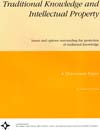 2. Traditional Knowledge & Intellectual Property. Issues and Options Surrounding the Protection of Traditional Knowledge. (English, Espanol). (28pp)
2. Traditional Knowledge & Intellectual Property. Issues and Options Surrounding the Protection of Traditional Knowledge. (English, Espanol). (28pp)
Carlos Correa, November 2001.
Outlines policy issues surrounding the protection of Traditional Knowledge in TRIPS and other international fora.
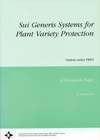 3. Sui Generis Systems for Plant Variety Protection: Some Options under TRIPS. (English, Espanol). (28pp)
3. Sui Generis Systems for Plant Variety Protection: Some Options under TRIPS. (English, Espanol). (28pp)
Biswajit Dhar, April 2002.
Examines history of and legal options available under sui generis systems in TRIPS for plant variety protection, in particular UPOV, Indian and Namibian approaches, and their likely impact on farming communities.
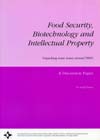 4. Food Security, Biotechnology & Intellectual Property: Unpacking some Issues around TRIPS. (English, Espanol) (28pp)
4. Food Security, Biotechnology & Intellectual Property: Unpacking some Issues around TRIPS. (English, Espanol) (28pp)
Geoff Tansey, July 2002.
Discusses biotechnology and the minimum standards of intellectual property rights required of Members of the World Trade Organisation and affects on food security.
ISSUE PAPERS - in these authors examine a subject of importance to the development of the international intellectual property regime. The topics were selected following consultations with negotiators from developing countries.
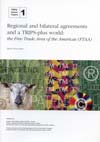 1. Regional & Bilateral Agreements and a TRIPS-plus world. The Free Trade Area of the Americas (FTAA). (English, Espanol). (36pp)
1. Regional & Bilateral Agreements and a TRIPS-plus world. The Free Trade Area of the Americas (FTAA). (English, Espanol). (36pp)
David Vivas-Eugui, July 2003.
Provides an overview, based on intellectual property rights negotiations in the Americas, of some of the implications of regional and bilateral TRIPS plus agreements for the current minimum standards under TRIPS.
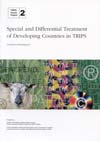 2. Special & Differential Treatment of Developing Countries in TRIPS. (English). (23pp)
2. Special & Differential Treatment of Developing Countries in TRIPS. (English). (23pp)
Constantine Michalopoulos, October 2003.
Analyses the special and differential treatment provisions in the TRIPS Agreement, assesses their implementation in support of development, and makes 10 recommendations for change.
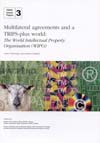 3. Multilateral Agreements and a TRIPS plus World. The World Intellectual Property Organisation - WIPO. (English, Espanol). (32pp)
3. Multilateral Agreements and a TRIPS plus World. The World Intellectual Property Organisation - WIPO. (English, Espanol). (32pp)
Sisule Musungu & Graham Dutfield, December 2003.
Discusses TRIPS-plus standards at the multilateral level particularly in WIPO, negotiations at WIPO, its mandate in relation to UN development goals, and its role in harmonising patent law standards.
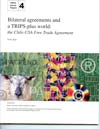 4. Bilateral Agreements and a TRIPS-plus World. The Chile-USA Free Trade Agreement. (English, Espanol). (56pp)
4. Bilateral Agreements and a TRIPS-plus World. The Chile-USA Free Trade Agreement. (English, Espanol). (56pp)
Pedro Roffe, October 2004.
Contributes to a better understanding of TRIPS plus issues as found in the FTA and the lessons that can be drawn from the negotiations between the most powerful and technologically advanced country in the world and a small but dynamic developing country with an open and liberal economy.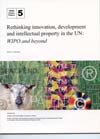 5. Rethinking innovation, development and intellectual property in the UN: WIPO and beyond (English)
5. Rethinking innovation, development and intellectual property in the UN: WIPO and beyond (English)
Sisule F. Musungu, September 2005. (39pp)
Focuses on how the mandates and competencies of key UN institutions relevant to innovation, development and intellectual property can be brought to bear in addressing the challenges of the 21st century knowledge society.
OCCASIONAL PAPERS - are normally written by individuals who participated in QUNO and QIAP dialogues. These papers build upon the author's presentation at a dialogue.
1. Trade-Offs and Trade Linkages: TRIPS in a Negotiating Context. (English) 12pp
Peter Drahos, September 2000.
Discusses a practical economics of IP, trade gains and loses, lessons for developing countries from the Uruguay Trade Round and the future for TRIPS
2. Micro-organisms, Definitions and Options under TRIPS. (English) 20pp
Margaret Llwewlyn & Mike Adcock, November 2000.
Examines a variety of scientific and legal definitions of micro-organisms, the role of lawyers, alternatives under TRIPS, and possible options
3. Generic Drugs, Compulsory Licensing & other Intellectual Property Tools for Improving Access to Medicine. (English) 9pp
Michael Gollin, May 2001.
Discusses common goals, a practical approach, the life cycle of a drug, an IP decision tree for access to drugs, differential pricing, and national legislation under TRIPS.
4. Exploring the Hidden Costs of Patents. (English) 27pp
Stuart Macdonald, May 2001.
Discusses patents in practice, who benefits, the difference between invention and innovation, who uses patents and effects of strengthening the system, especially on the weak, and the costs of patents through illusion and distortion.
5. TRIPS Disputes: Implications for the Pharmaceutical Sector. (English) 13pp
Carlos Correa, July 2001.
Examines the subjects of disputes, relationship between TRIPS and GATT, principles of interpretation, object and purpose of TRIPS, interpreting domestic law, discrimination vs differentiation, interpretative approaches, and impending cases.
6. Some Assumptions on Patent Law and Pharmaceutical R&D. (English) 14pp
Carlos Correa, July 2001.
Discusses public involvement in R&D, efficiency, medicines for the poor, patent protection in developing countries, and patents and innovation.
7. The TRIPS Agreement, Access to Medicines & the WTO Doha Ministerial Conference. (English) 41pp
Frederick Abbott, September 2001.
Examines the relations between access to medicines and TRIPS including discussion of compulsory licensing, parallel importation, TRIPS Articles 7 & 8, patents, trademarks and copyright, data protection, the HIV/ADIS pandemic, and possible actions in Doha
8. Geographical Indications and TRIPS. (English) 19pp
Michael Blakeney, November 2001.
Discusses definition of GIs, approaches under national laws, international protection, bilateral and plurilateral agreements, and policy issues arising under TRIPS
9. Compulsory Licensing for Public Health Needs: The TRIPS Agenda at the WTO after the Doha Declaration on Public Health. (English) 57pp
Frederick Abbott, February 2002.
Provides a detailed examination of ways to implement paragraph 6 of the Doha Declaration on TRIPS and Public Health including Article 30 & 31 based solutions
10. Negotiating Intellectual Property: Mandates and Options in the Doha Work Programme. (English) 16pp
Jonathan Hepburn, November 2002.
Draws together the outstanding areas for action in WTO, examines lessons from the review of Article 27.3(b) of TRIPS, related issues in WIPO and bilateral and regional institutions
11. Non-Violation Nullification or Impairment Causes of Action under the TRIPS Agreement and the Fifth Ministerial Conference: A warning and reminder. (English)
Frederick Abbott, 2002. 3pp
Warns that non-violation and article 64.3 of TRISP should not be overlooked and explains why.
12. Establishing a Disclosure of Origin Obligation in the TRIPS Agreement. (English)
Carlos Correa, 2003. 11pp
Discusses the purposes of DoO, national and international precedents, the scope of an obligation and discharging it, and the issues arising in TRIPS.
13. Trade Diplomacy, the Rule of Law and the Problem of Asymmetric Risks in TRIPS. (English) 7pp
Frederick Abbott, September 2003.
Summary: Discusses political and legal responses to pressures that may undermine implementation of the paragraph 6 decision
14. The Doha Declaration on the TRIPS Agreement and Public Health and the Contradictory Trend in Bilateral and Regional Free Trade Agreements. (English)
Frederick Abbott, April 2004. 11pp
Examines contradictory trends to those achieved in the Doha Declaration on TRIPS and Public Health, particularly in CAFTA and the Morocco and Australia FTAs.
15. Harmonisation or Differentiation in Intellectual Property Protection? The Lessons of History. (English) 15pp
Graham Dutfield and Uma Suthersanen, August 2004.
Discusses harmonisation in a dynamic historical context, the issues at stake, experiences from business history in Germany, Switzerland, India, Japan and the Asian Tigers, the USA and their implications.
16. The Politics and Practicalities of a Disclosure of Origin Obligation. (English)
Carlos Correa, January 2005. 10pp
Examines developing countries objectives and justifications for a DoO, practical issues, consistency with TRIPS and coherence in different negotiating fora.
17. Disclosure of Origin and Access and Benefit Sharing: The special case of seeds for food and agriculture (English), 10pp
Walter Smolders, October 2005,
Discusses current trends and status, the history of access to plant genetic resources for food and agriculture, role of intellectual property and the threat that patents pose.
18. Thinking Aloud in Disclosure of Origin (English), 12pp
Graham Dutfield, October 2005,
Reflects on three versions of declaration of origin - voluntary, mandatory and proof of legal acquisition - discusses what difference disclosure of origin in patent application would have made to hoodia, neem, enola bean and rosy periwinkle cases and compatibility with the TRIPS Agreement.
